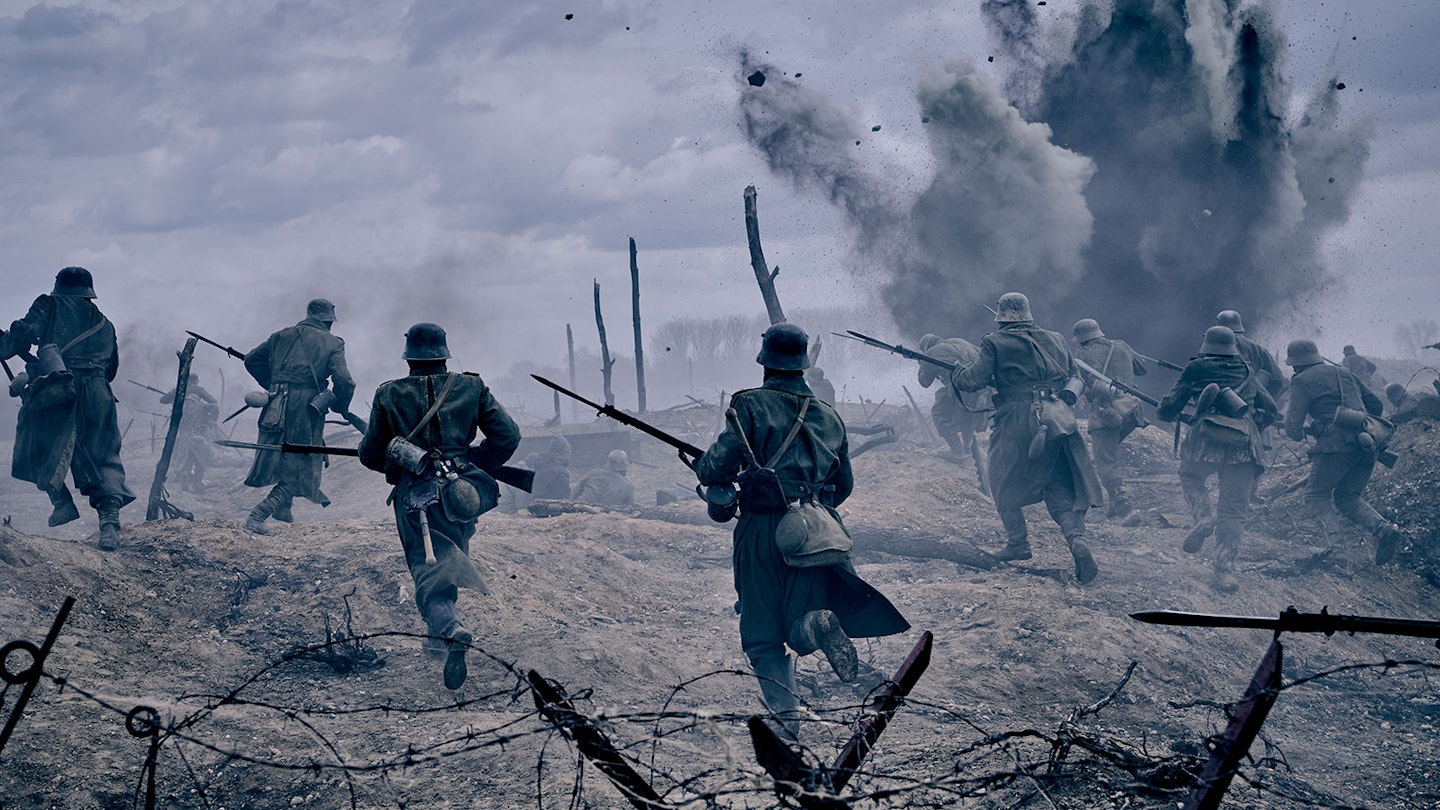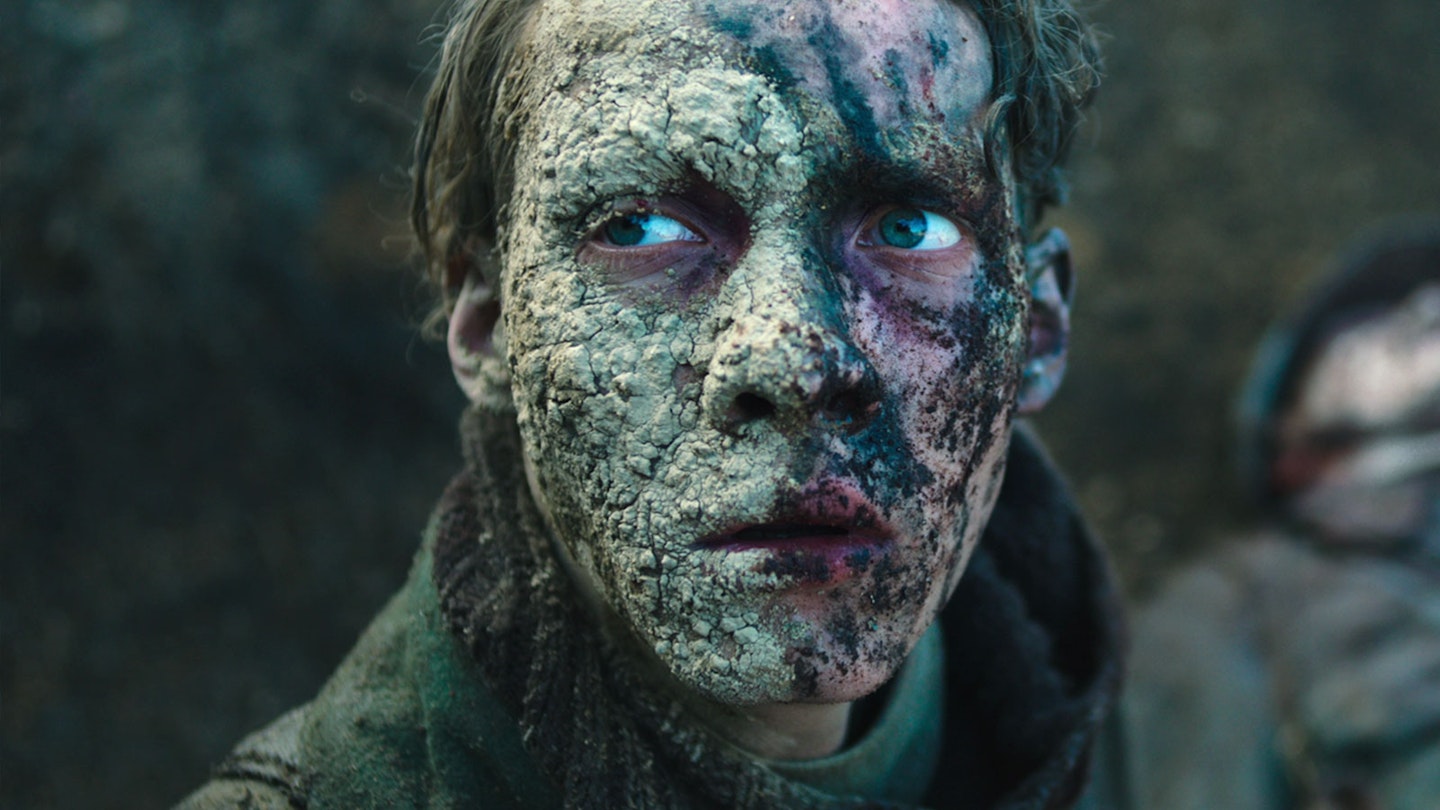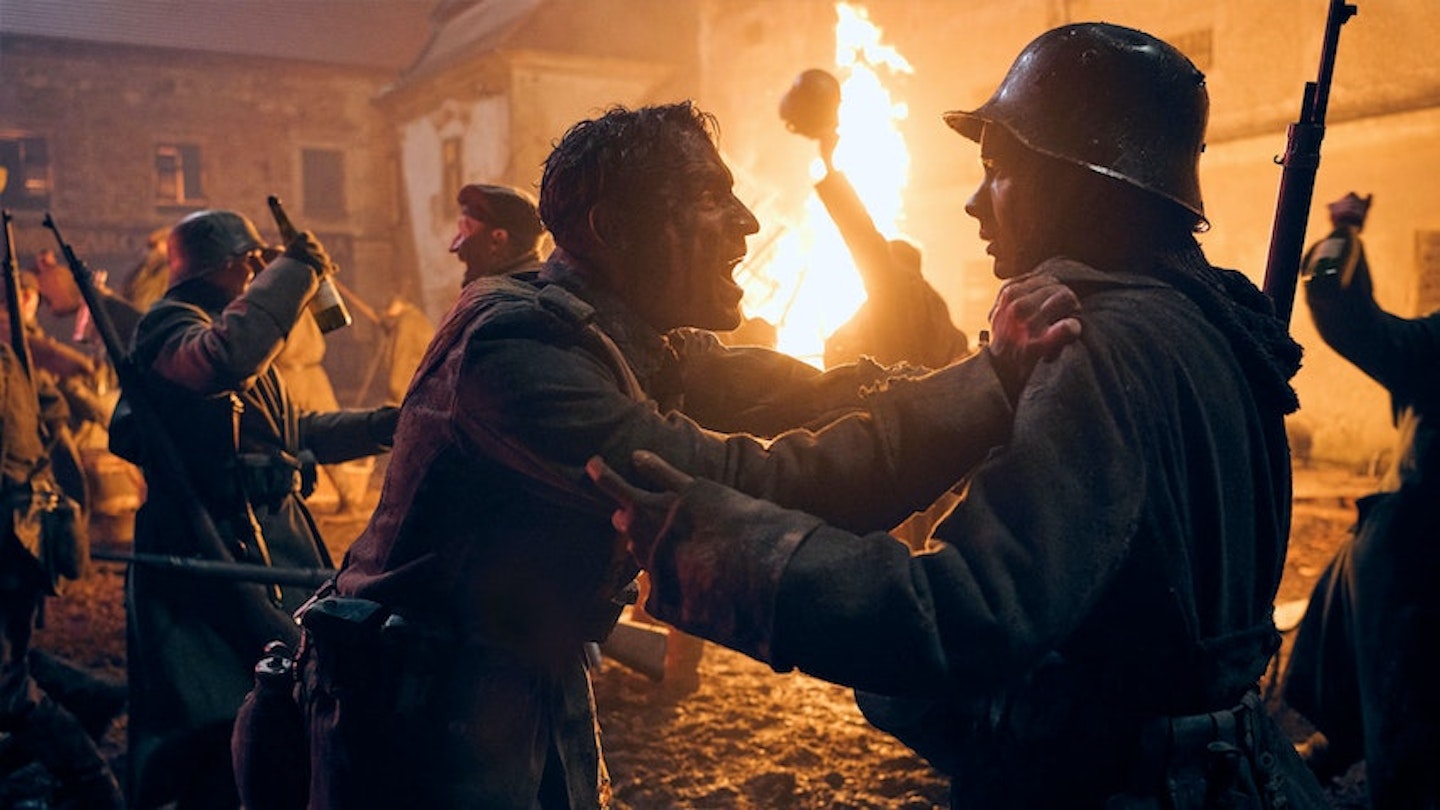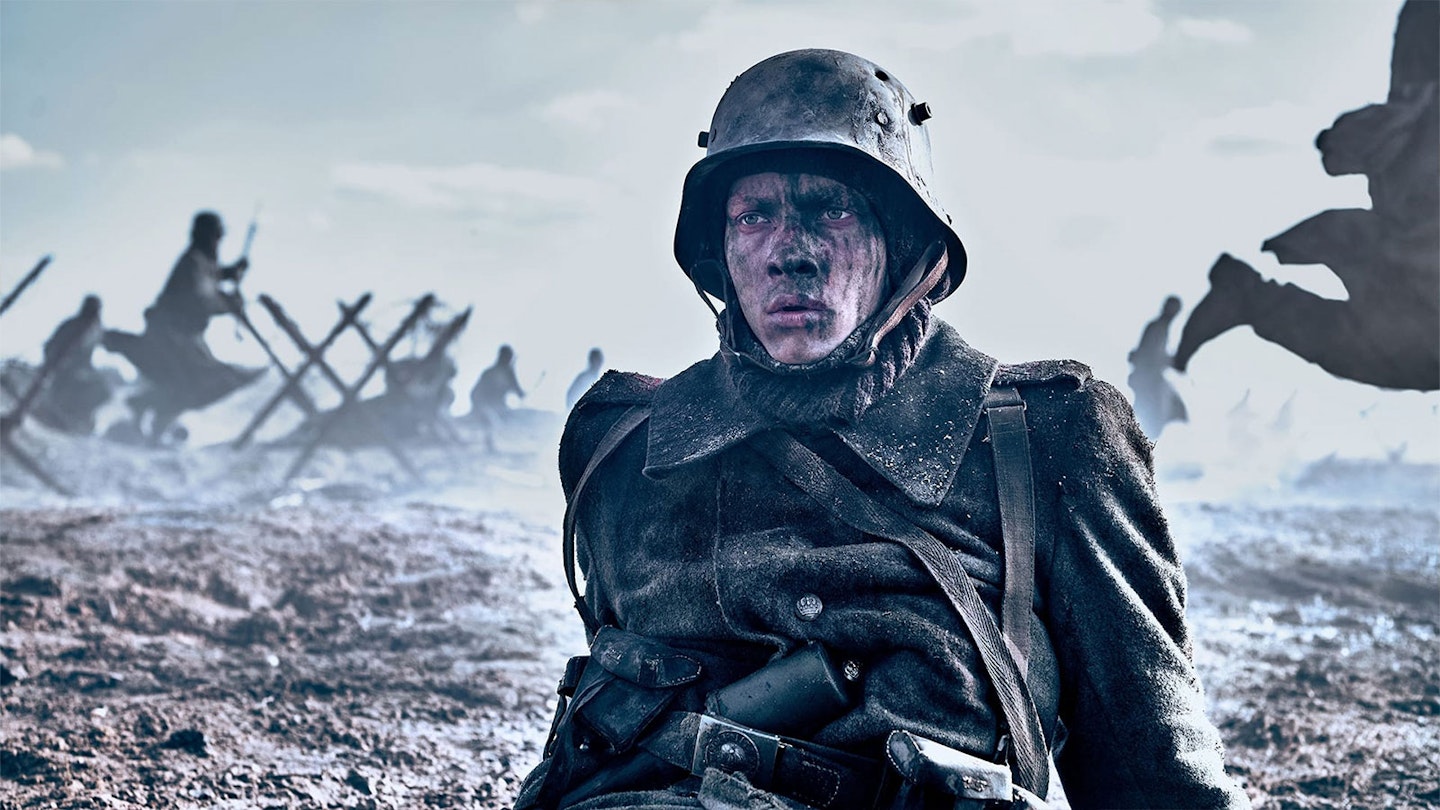There’s a lovely moment toward the end of All Quiet On The Western Front, sandwiched between several truly awful moments (and one absolutely devastating one). Felix Kammerer’s Paul Bäumer tries to walk his friend Kat (Albrecht Schuch) back to a field hospital in a church. He’s been shot, and he’s bleeding badly. Trying to stay chipper, Kat remembers a word game he used to play. You rhyme something with the last line someone sang. “Nothing rhymes with trifle,” Kat says. “Nothing.” Paul thinks. “Rifle rhymes with trifle,” he says. The two men laugh. It’s the last time anyone laughs in All Quiet On The Western Front.
Edward Berger’s film recently won a barrage of BAFTAs, and there’s a good chance it could make a proper charge over the top for a good handful of its nine Oscar nominations too. But it’s not your average war film. In Britain, the popular view of World War I is that phrase of the German General Ludendorff’s: that the heroic dead were lions led by donkeys in high command. This film leans that way too, with German General Friedrichs (Devid Striesow) fuming about not having had his chance to get his boots muddy before ascending to high office.

At the same time, though, this take on All Quiet does a lot of unexpected things. If you’ve ever seen a World War I film, you’ve seen the moonscapes of No Man’s Land, and the mud, and the corpses everywhere. They often aim for sensory overload, but they tend to overload the same senses: your ears and your eyes are full of sound and disorientating, chaotic images. But All Quiet On The Western Front aims for your taste buds and your nostrils too. I don’t think I’ve ever seen a war film which is quite so fascinated by food. A roast goose the men share looks absolutely delicious. A vegetable broth is stomped into the mud as an attack breaks toward French lines. The new recruits sing about coffee, tea, sugar and wine. Friedrich throws away the last drops of his own wine and chucks his dog leftovers that the soldiers would have treated like finest steak. Food is a shortcut to joy and sensation in a world which is free of either, and it’s shot in a way that pulls you straight into the soldiers’ senses – rediscovering those sensations which remind them of their humanity after so long having to suppress it to survive. Stuck in a hovel, sensing death everywhere, their smell, touch and taste dims. It’s telling that when Paul runs into the final, pointless charge, he grunts and grimaces animalistically.
The particular kinds of brutality in All Quiet On The Western Front are rare in their bluntness.
Felix Kammerer is particularly brilliant as Paul. Remarkably, this is Kammerer’s big screen debut. His high cheekbones and searching eyes give him a skeletal look which makes him look like he’s dead already. One of the starkest images in the whole film is simply Kammerer’s face, when Paul he realises he’s killed the Frenchman who had tumbled into the same shellhole as him; half of his expression is streaked with black mud, the other is caked in putrid, greenish goo. That sergeant who told Paul he’d be dead by the morning was right. The boy who faked his parents’ signatures to go to war is gone.

There’s subtle poetry here too. Towards the start, the spindle of a sewing machine whirs into action. As its needle patches up the uniform of a dead man, ready to keep the next dead man warm, its rhythmic clicking turns into staccato machine gun fire. The spinning wheel rhymes with the drivetrain of a truck taking new recruits to their deaths. This is a total war, and the seamstress is as much a cog in the machine as the 18-year-old private.
It’s also very, very, very gnarly. We’ve all seen people get blown up on screen before, sure. But the particular kinds of brutality All Quiet On The Western Front are rare in their bluntness. A man gets run over by a tank, which goes about as well as you’d expect. One of Paul’s mates gets flamethrowered. Paul’s last scrap with a French soldier sees him almost drowning in the mud. When they’re seen off by their teacher, the Iron Youth are called to noble ideas: God, the Kaiser, the Fatherland. But being noble isn’t possible. They steal from a farmer, kill brutally, feel fear and shame rather than proudly marching into glory. Usually there’s some small glimmer of light, some brotherhood in the trenches to wipe away the filth. George Mackay made it to Richard Madden in 1917, for instance, and while Colonel Dax in Stanley Kubrick’s Paths Of Glory can’t stop a firing squad, he does at least tell his commander what he thinks of him and protects some regular soldiers from returning to the front.

All Quiet On The Western Front doesn’t allow itself to soften even slightly. Nobody talks about what they’re fighting for. The soldiers’ friendship doesn’t save any one of them. Nobody gets to be a hero. If the viewpoint looks familiar to British eyes, the execution is particularly German. Over here, most First World War stories have a pained nobility to them which comes with knowing that Britain and the allies won, notionally. With All Quiet, we see the First World War from the perspective of a nation which has thrown hundreds of thousands of its young men into a grinding, terrible conflict which it then lost. There is no comfort to be found. This is an army – and a nation – punchdrunk from four years of total war, dazed and confused. Some of its men drink and scream. Some are silent. Some drift from reality: having dragged him to a field hospital, Paul can’t believe that his dead friend Kat isn’t just unconscious.
The final shot of the original All Quiet On The Western Front from 1930 is one of the most elegant and poignant in German cinema: Paul reaches out above the top of the trench to see a rare butterfly, and is promptly shot. Not so, in Berger’s version. This time, Paul is so utterly empty that he charges in and kills effectively and urgently. With seconds of the war to go, he’s stabbed by an unseen French soldier. He feels the sun on his skin, and dies. These aren’t lions led by donkeys, they’re boys led by deluded madmen. That’s what makes this film so special: it looks right into your eyes as it pushes the bayonet in.
All Quiet On The Western Front is streaming now on Netflix
